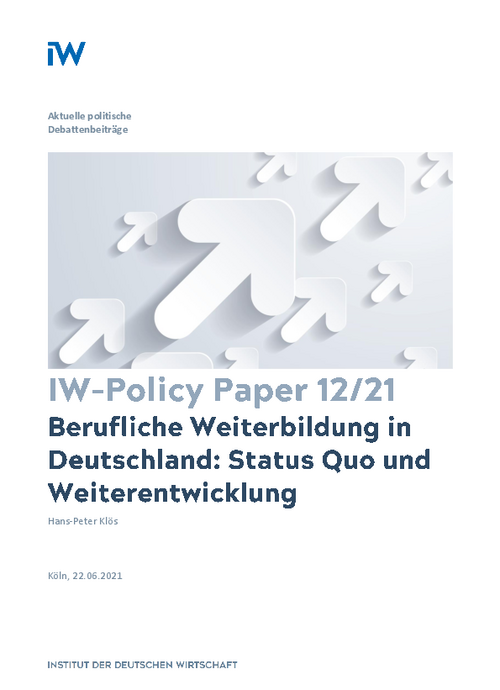A fundamental position in the political debate on continuing vocal education and training (CVET) in Germany, which is gaining in breadth, advocates a system change with a CVET Act, extended legal and exemption options for CVET, a basic education income, CVET funds, and the introduction of employment insurance.

Continuing Vocational Education and Training in Germany: Status Quo and Further Development

A fundamental position in the political debate on continuing vocal education and training (CVET) in Germany, which is gaining in breadth, advocates a system change with a CVET Act, extended legal and exemption options for CVET, a basic education income, CVET funds, and the introduction of employment insurance.
In contrast, the position advocated here emphasises that expenditure on CVET has risen sharply, CVET funding in Germany is wide-ranging and has been significantly expanded by the new funding laws, systematic funding gaps are not discernible and demand orientation in CVET has been strengthened, also for employees.
Nevertheless, a critical review of the existing instruments and a discussion on new instruments is necessary for two reasons: First, in the case of sectoral or industry-related transformation processes, which are also accelerated to a large extent by political targets, additional support for in-company and individual continuing training through contributions or tax revenue may be justified. Second, the higher share of public funding for tertiary education leads to a financial disparity at the expense of vocational qualification, which can justify increased public support for in-company and job-related individual education.
The following recommendations can be derived from these findings: At the lower end of the qualification spectrum, further improvements could be achieved through a continued development of the existing training bonus. This bonus is based on an assessment, its interlinking with a qualification bonus for the low qualified, a more flexible shortening of the retraining period, increased use of partial qualifications and a clear reinforcement of job-related basic education.
For the middle qualification segment, it is recommended that both employees and companies re-evaluate the use of time accounts for individual CVET, revitalise subsidised education savings, examine basic elements of a CVET-BAföG, improve the promotion of e-learning offerings, further facilitate part-time formats in initial and continuing education, and enhance tax deductibility of CVET costs.
At the higher end of the qualification spectrum, promotion and further training scholarships should be expanded, informal learning should be eligible for credit in the assessment of competences, more digitised academic training across learning venues should be promoted by higher education institutions, and financial resources should be sustainably used to ensure that teachers at higher education institutions can play the most important role in the introduction of digitally enriched teaching, learning and examination formats, especially for SME’s.

Continuing Vocational Education and Training in Germany: Status Quo and Further Development

More on the topic

Further training needs of the automotive industry in transformation
Due to the ecological and digital transformation, significant parts of the German economy, particularly the industrial sector, are currently undergoing a transformation. This development also extends to the automotive sector, which occupies a vital position in ...
IW
The Increasing Importance of Literacy Courses and Further Training for the Low-skilled
Digitalisation and the demographic transition are presenting companies with ever new challenges. This puts pressure on firms to be in a process of constant change, a phenomenon reflected in the growing demands they put on their low-skilled employees.
IW